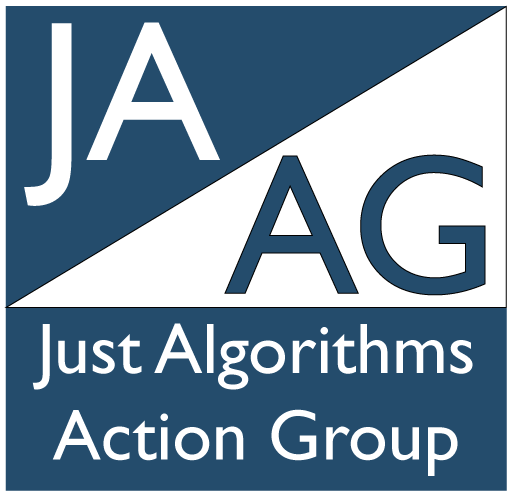Supporting Justice and Equality in AI
Digital systems play an ever growing part of our lives.
Their impacts on people can be negative as well as positive.
JAAG upholds radical ethical principles.
We are working towards a future in which no-one is treated unfairly through systems that use AI,
a future in which their harmful effects are minimised, and AI is used for social good.
We want the voices of vulnerable people to be heard in the development and use of AI systems.
We seek better regulation, standards and practice in AI.
What does JAAG do?
Investigates digitally enabled rule-based systems for socially unjust impacts
Contributes to the formation of UK government policy
Works for the development of practical solutions for AI ethical problems
Promotes teaching and learning about ethics in AI throughout society in general and computer engineers in particular.
The UK government is considering changing the law regarding AI and copyright.
The authors are in favour of strengthening copyright.
We argue that it is necessary to pursue Big Tech companies for their illegal use of copyrighted material.
In an ‘Exclusive’ report, the Guardian on 6 December reports that
An artificial intelligence system used by the UK government to detect welfare fraud is showing bias according to people’s age, disability, marital status and nationality,
Like it or not our lives are increasingly affected by new technologies and the Criminal Justice System is one area where Artificial Intelligence will play a significant part.
Ensuring justice and equality in healthcare is vital.
The use of AI in the conflict in Gaza is just one example of a wider problem: there is a global trend towards the increased application of military AI and other advanced technologies in conflict.
New ideologies – alongside neo-liberal and capitalist worldviews - are very influential among ‘Big Tech’ leaders: those who basically decide how AI develops. JAAG has very strong concerns about these viewpoints.
New ideologies – alongside neo-liberal and capitalist worldviews - are very influential among ‘Big Tech’ leaders: those who basically decide how AI develops. JAAG has very strong concerns about these viewpoints.
The UK Data Protection and Digital Information Bill will not become law in this Parliamentary session.
The British Computer Society (BCS) has just published, in their magazine ITNOW for computer professionals, an article by JAAG’s Andrew Nind and Siani Pearson
Earlier this month, Microsoft and Brookfield Renewables agreed the “largest ever corporate renewable energy deal”…
However, let us ask the following questions:
It will be a further year before the UK Online Safety Act Codes of Practice are published and the Statutory Effect comes into play. It must feel to some as if the Online Safety Act is still offline.
JAAG is working with a team led by the Lord Mayor of the City of London to develop training courses on AI ethics for finance professionals
JAAG wants the UK Government to make major changes to the Data Protection and Digital Information Bill, currently being debated in the House of Lords.
Government should be under a legal duty to be upfront about when it uses AI to make decisions that affect people’s lives – such as in education, health or welfare.
Recent research has shown that generative artificial intelligence (GAI), repeats and replicates racial stereotypes (like the one in this AI -generated image).
The rapid development of AI systems brings with it hitherto unthought-of ethical dilemmas. How can society deal with them?
JAAG is extremely concerned at the government's plans for a Federated Data Platform (FDP) for NHS health data
A parliamentary report urges the UK government to make a "serious, rapid and effective effort to establish the right governance frameworks” on artificial intelligence (AI)
We need to do more than just hope that AI can gain an ethical consciousness.
Only if the whole of society is given a voice can we ensure that the future of AI is as safe and beneficial as possible for everyone.
65 UK MPs and peers, from all political parties, have called for the use of live facial recognition surveillance to be put on pause.
JAAG’s new policy on Equality, Diversity and Inclusion has come into effect.
After months of delay, the UK Government introduced their revised version of this Bill into the House of Commons on 8 March 2023. Will this version respond to JAAG’s many concerns?
Dr Zella King explains how AI is being used to improve the effectiveness of the Health Service.
JAAG is concerned that, if enacted, the Data Protection and Digital Information Bill could seriously weaken individuals’ rights to protect their personal data and to challenge its misuse or loss of confidentiality.
Peter Hanley shares his experience of responding to Government consultations and finds it an amazing and humbling experience.
Although British people are now generally comfortable about having organisations use their data, especially for the public good, they find AI “scary and futuristic”.
You can make a difference
JAAG is a grassroots movement. If you share our concerns, please join us.
If you are not ready to become a member yet but would like to support our work, please donate to JAAG. Thank you!





























Mike Nellis, Emeritus Professor of Criminal and Community justice at the University of Strathclyde questions the benefits that AI would allegedly bring to our under-resourced and overstretched probation service.